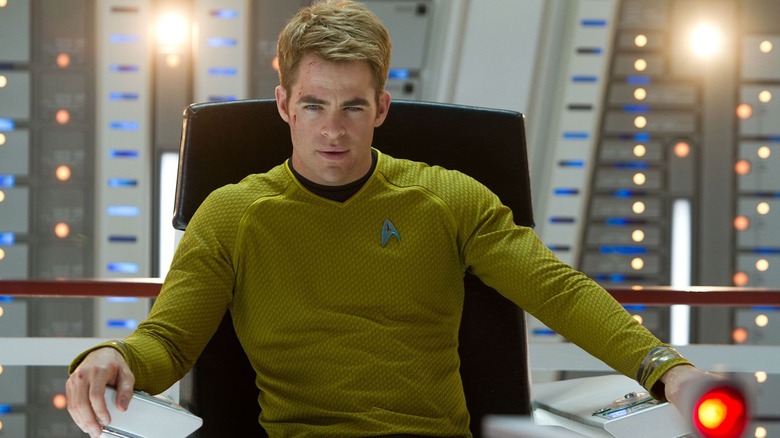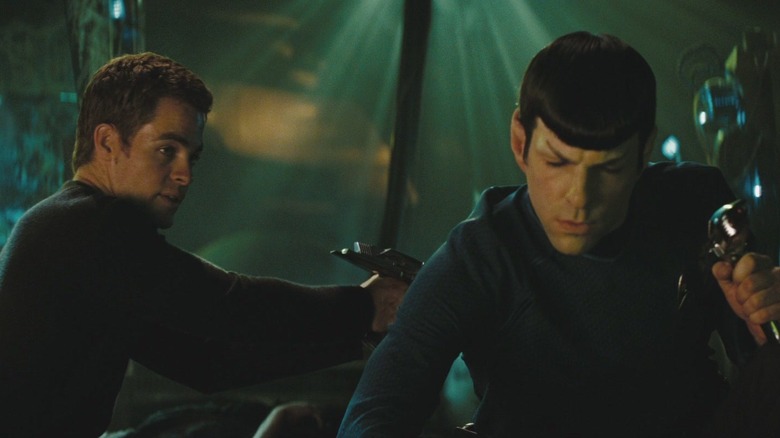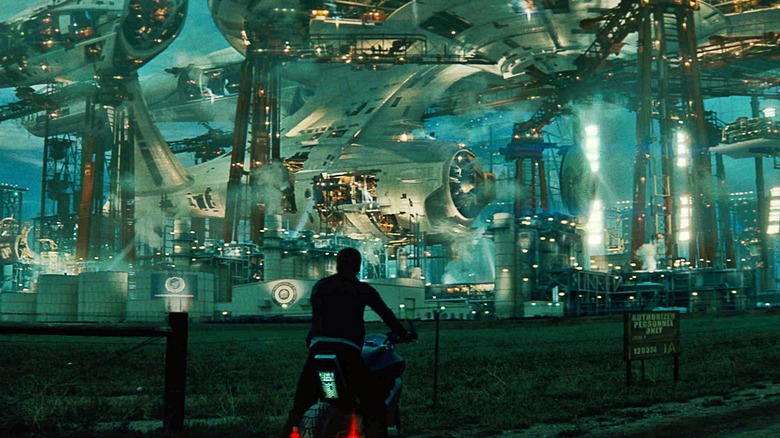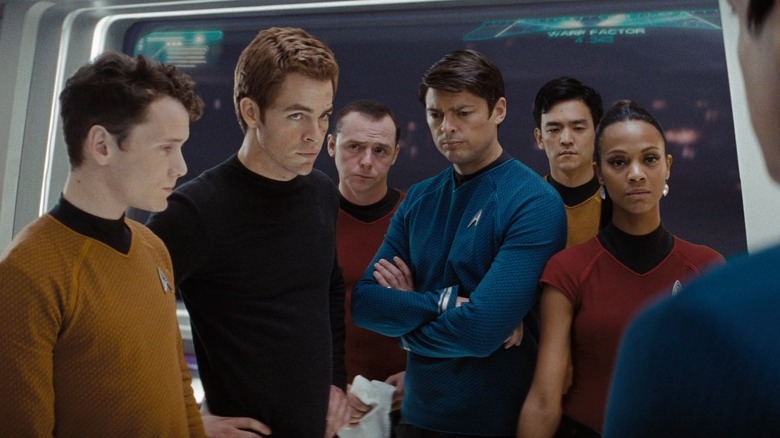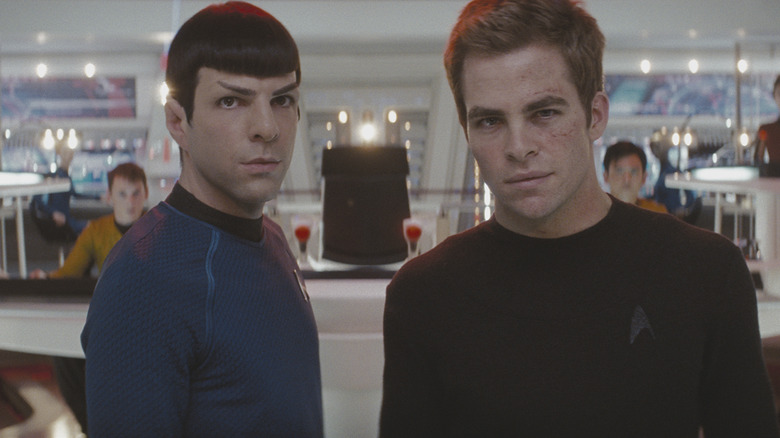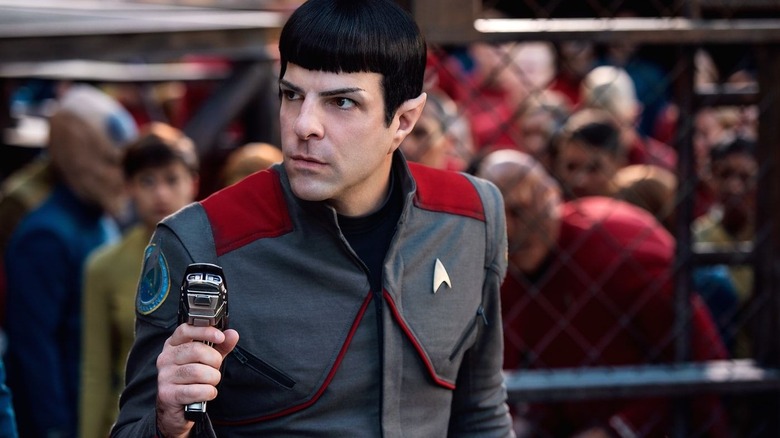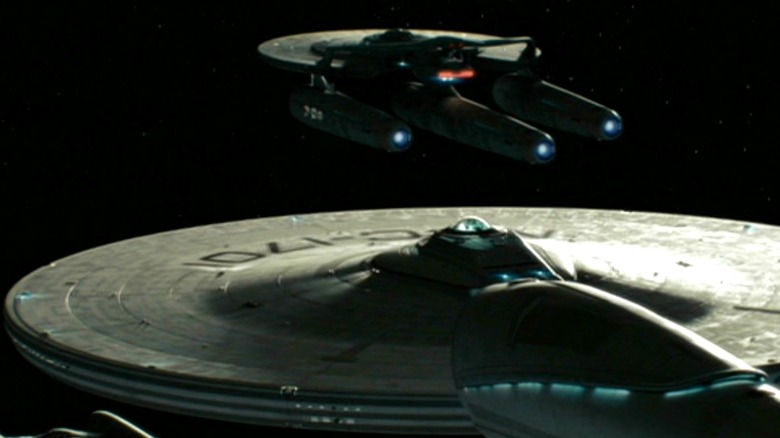Before J.J. Abrams, Star Trek Almost Got Its Own Version Of The Dark Knight Trilogy
The post-9/11 world was rough on "Star Trek." The not-super-popular "Star Trek: Enterprise" debuted on September 26, 2001, and the world wasn't in the mood. The U.S. president at the time, George W. Bush, began to affect violent, revenge-forward rhetoric, and many U.S. citizens were in a bitter, wounded mindset. While some may say that the utopian future of "Trek" was needed at that time, one can see how its idealism felt out of place. "Star Trek" would have us reaching out to our enemies and solving problems through diplomacy. That suggested course of action didn't sit well with a nation itching to enact justice. It's no wonder films like "The Avengers" took off in the post-9/11 milieu; the Avengers avenge the destruction of our cities. Diplomacy was out, freelance super-powered military mercs were in.
So when "Enterprise" was canceled in 2005 after four seasons, it seemed that "Star Trek" was at an end. The "Trek" movies had also recently petered out with the release of the terribly unsuccessful "Star Trek: Nemesis" in 2002. Trekkies could now only look back on the previous 39 years of entertainment and hold those hundreds of hours of film and TV close to our hearts. Second star to the right and straight on 'til morning.
But it seems the head honchos at "Trek" weren't quite done yet. Trying to keep the franchise alive and relevant in 2005, executive producer Rick Berman conceived of an idea to explore the lives of a young Kirk and a young Spock in a new feature film. That film, called "Star Trek: The Beginning," is discussed in the notable oral history book "The Fifty-Year Mission: The Next 25 Years: From The Next Generation to J. J. Abrams," edited by Mark A. Altman and Edward Gross.
Star Trek: The Beginning
In 2001, screenwriter Erik Jendresen came into the public eye writing the hit TV series "Band of Brothers" for Tom Hanks and Steven Spielberg. He was in high demand and, perhaps naturally, got a call from Paramount about the possibility of writing a "Star Trek" movie. Jendresen was not a Trekkie, so he balked at the offer. Indeed, his view of sci-fi was very specific, literary, and classic. He said:
"Shortly after 'Band of Brothers,' I got a call from my agent, who said, 'Would you be interested in getting into "Star Trek?"' And I said, 'No.' First of all, because I don't really like science fiction. I'm kind of an odd purist that way. If it's not Jules Verne or H.G. Wells or Edgar Allen Poe or Arthur Conan Doyle, I'm not that interested. The space opera genre of science fiction is just something that has never held any interest for me. But they didn't take no for an answer."
For producer Jordan Kerner, though, it was just a matter of convincing Jendrensen to find an "in." If he could be made interested in "Star Trek" as a concept, then he might want to write a screenplay. Knowing that the new film was to be about James T. Kirk — a forthrightly literary character — certainly piqued Jendresen's interest:
"Kerner really wanted to have a conversation, so they called me back and said, 'Would you come consult with us?' And I said, 'Sure.' And I was very honest with them. I loved two things about 'Star Trek.' The first was this sort of Horatio Hornblower aspect to Kirk. All of that boldness. It's sort of a throwback to a great kind of literary figure and hero."
Classic "Star Trek." So far, so good.
The pitch experience
Jendresen also appreciated the franchise's tendency to be political. He said that he "loved the fact that the stories were always, at the time, of political or social relevance. There was a message behind them all. And it was kind of lovely. I really respected that."
Rick Berman noted that making a "Star Trek" movie was more of Kerner's mandate, as it was part of his contract when he took a job at Paramount. Hence, the hiring of a screenwriter. Jendresen recalled that Berman was ready to step away from "Star Trek," knowing that a lot of Trekkies weren't so fond of his position overseeing everything. This was a new regime, just beginning, and Jedrensen was going to be one of its golden children. He recalls the entire experience of pitching a new "Star Trek" movie over producer Donald De Line's desk, located somewhere in Southern California. It didn't feel right. Jendresen explained:
"We went in to pitch it to the head of the studio, Donald De Line. We sat down and started telling the story. I've been in a lot of rooms in Hollywood. I've pitched a lot of projects. I've never been in a more preternaturally dead room than this one. It was like being in a sensory deprivation tank. There was not a sound, and in the middle of the pitch I thought, 'This is really odd.' In the middle of it, I look over to the sofas and one of the producers is sitting there and he started doing that 'Kennedy just got shot' with his fist under his chin."
Despite the dead room, Jendresen continued to pitch his idea for 45 minutes. At the end, the producers shook his hand, suddenly ecstatic. He got the job.
The actual idea
According to Glen C. Oliver, one of the critics at Ain't It Cool News who had read Jendresen's script, "Star Trek: The Beginning" was to follow the adventures of a character named Tiberius Chase, one of Kirk's ancestors. The story would involve a genocidal campaign by the Romulans against Earth in an effort to kill all the Vulcans living there. Given the time frame, it seems that "Star Trek: The Beginning" was to take place only a few decades after the events of "Enterprise," but also a few decades prior to the events of the original "Star Trek" series. Oliver recalled that the tone of the script — perhaps borrowing from "Band of Brothers" — was very World War II-tragic. One of the speeches made by the Chase character even sounded like a letter written by a soldier in the 1940s: "I will still, and forever, wonder how one can go boldly and follow at the same time?"
One might take note that some of these concepts would appear in the eventual 2009 "Star Trek" film directed by J.J. Abrams.
Jendresen elucidated by saying:
"This is all happening during the Serbian-Croatian conflict. So the whole notion was of this interstellar ethnic cleansing going on. It was really about something. And the fact that the Earth stands up against the Romulans and says, 'No.' The needs of the few outweighs the needs of the many. That is the moment when the Earth stands up and says no."
Oliver did note that "Star Trek: The Beginning" was a massive departure from the previous "Star Trek" ethos, which traditionally cleaved to pacifism. This new film was to be a straight-up military thriller of a type never seen in the franchise, not even during the days of "Deep Space Nine."
Respecting canon
Despite the tonal departure, Jendresen felt he was respectful to "Star Trek" canon, which he knew was massively important to the franchise's many fans. He still wasn't a Trekkie at the end of the experience, but he was proud of his work. He also came to understand Trekkies, as he began to equate their preoccupations with some of his own pop interests. Jendresen noted:
"By the time I was finished writing it, I was quite shocked about the whole thing. I really enjoyed the process. I was also very well aware of the fact that because of the agnostic feeling I had toward the genre, and I wasn't a die-hard fan, I was able to serve it better, because I wasn't precious. My own feelings about a story or a canon of material are as strong as most Trekkies are for the [Doyle] books. That was something I was crazed about as a kid. To this day, I still am."
One might find evidence of Kirk's family in expanded-universe lore and tie-in novels, but Kirk rarely talked about his family explicitly in any of the "Star Trek" shows or movies. Jendresen was free to explore that character. He also liked the idea of writing a character who didn't live into the rest of "Star Trek" canon. He was free to harm Chase or make him as tragic as he wanted:
"Having to come up with some kind of clever way to be able to have a human encounter a Romulan and deal with the notion that no one lives to tell of it. And it was really fun to try to tackle the idea of Kirk's progenitor. Who is this guy that he was named after? Where did his spirit originate from? I really embraced it."
The Beginning trilogy
Both Jendresen and Oliver noted that an ultra-military world was very strange for "Star Trek," but both acknowledged that Starfleet — by the franchise's own canonical history — couldn't be born before Earth survived several devastating wars. Jendresen merely wanted to see what the world of "Star Trek" looked like during those wars. There was a time in "Star Trek" history when the world was not placid and put-together, and looked more like "Starship Troopers." The critic said, however, that the cliffhanger ending of the screenplay to "Star Trek: The Beginning" left a lot to be desired. Oliver noted:
"It's difficult to completely assess the full success of Jendresen's overall intent here, though. My understanding is that 'The Beginning' was the first of three intended movies, and as such it ends somewhat ambiguously. Thus, the payoff of several important plot threads is currently, and will likely forever be, unclear. If whatever he planned next was as forward-thinking and out of the box as his first installment. We'd have seen a very unusual, very grown-up 'Trek' for the ages."
Jendresen, meanwhile, already had begun to figure out what the next movie in the series might be, noting that "The Beginning" would indeed be the first part of a three-film cycle, all literarily inspired. In his words:
"I was so looking forward to the second one, because it was going to be a chase from Romulan space. And also, the great notion being that most of the Romulan fleet would be heading back to Romulus from Earth so they are sort of on a collision course with the whole Romulan fleet. During the course of this, there would be conflict, tension, and suspense. But, I was looking forward to inventing the adventures of Odysseus on his way home, back to Penelope."
Christopher Walken, captain of the evil UFOs
"Star Trek: The Beginning," then, was to be a sci-fi, WWII-inflected rendition of "The Iliad," with Kirk's grandfather serving as Odysseus. Not a bad pitch! The follow-up film was to be the soldiers returning home from the battlefield, very much like "The Odyssey." Jedresen even began to brainstorm what might happen on that Odyssey, and the kinds of character Chase would meet along the way. Most significantly, Jendresen wanted to include Chase's own father as a notable villain. He even knew which actor he wanted to play this villain:
"I did have one person in mind when I wrote it. But it's a tertiary character. Tiberius is Kirk's great-grandfather. So his great-great-grandfather is Tiberius' father, Otto Chase, who leads this group of xenophobes, and I was just absolutely convinced there was only one guy to play him. And that was Christopher Walken. I would have brought him back in the sequel. He was such a colorful character."
The "Beginning" project likely fell apart because of a schism in Viacom in 2006, causing the film and the TV rights of "Star Trek" to be split among two companies. Jendresen's ideas about a Romulan attack fleet and the extermination of the Vulcans found their way into the screenplay written by Alex Kurtzman and Roberto Orci for J.J. Abrams' 2009 film. The 2009 film was also extremely militant (the characters even wore army-like uniforms in "Star Trek Into Darkness") and looked back at events prior to the original series.
Would Jendresen's war trilogy have been better? We can only speculate.
